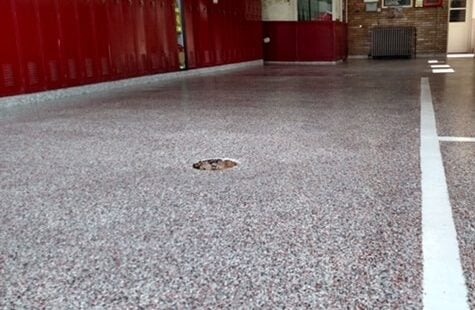Epoxy garage flooring is an increasingly popular choice for homeowners looking to enhance the durability and aesthetic appeal of their garage floors. It offers protection against:
- Stains
- Cracks
- General wear and tear
These attributes make it an attractive option if you are seeking a long-lasting solution. Because of the increasing demand, we at Floor Shield often get asked, “What’s the price per square foot to epoxy my concrete floor?” and “What are the product variations that affect the price?”
Today, we’ll answer both questions honestly so that you know if coating your garage floor with epoxy is a worthwhile investment for you.
HERE’S HOW MUCH EPOXY FLOORING COSTS
Generally, you can expect your epoxy project cost to be anywhere from $3 to $12.
For the average 2-car garage that totals about 360 square feet, that’d be $1,080 on the lowest end and $4,320 on the highest.
The cost of epoxy garage flooring varies significantly due to several factors, including:
- The type of epoxy.
- The size of the space you need to be coated.
- Whether you choose to get a professional installation or do the work yourself.
- How many cracks need to be patched.
- Does the floor need to be ground down to achieve a smooth and even surface? (Usually the case).
For any concrete coating, hairline cracks can usually be coated over without any issue. Taking the step to smooth and level the floor before applying your chosen product is essential to avoid any adhesion issues that might cause the epoxy to peel off.
Many DIY (Do It Yourself) kits come with an acid etch leveler, but these pale in comparison to the thorough precision of a grinder tool. This is one of the many reasons we recommend going with a professional installer who has all the tools on hand to avoid future complications.
We mainly utilize our 100% polyaspartic coating for most jobs at Floor Shield, but we recognize the value of the more budget-friendly epoxy solutions at the lower end of the price range. This is why Floor Shield sells our own line of epoxies.
It shouldn’t be understated that ultimately, coating your floor is an investment in:
- Aesthetics
- Cleanliness
- Increasing the value of your property.
Bare concrete not only looks dull but is susceptible to water-related issues like lichen, algae, and mold. Since concrete is porous, it easily accumulates these harmful biological growths. Coating over your concrete seals these pores and doesn’t allow water to get inside from the surface.
ARE THERE DIFFERENT TYPES OF EPOXIES?
There are several types of epoxies available for garage flooring, each with its own set of characteristics and cost implications:
Water-Based Epoxy
Cost: Water-based epoxy is the most cost-effective option.
Durability: While it offers good protection, it may not be as durable as other types.
Solvent-Based Epoxy
Cost: Solvent-based epoxy falls in the mid-range regarding cost.
Durability: It provides better durability compared to water-based epoxy and will require additional cleanup.
Metallic Epoxy
Cost: Metallic epoxy is considerably more expensive than the former two.
Durability: It is known for its high durability and unique appearance.
Customization: Metallic epoxies are highly customizable and often feature multicolored designs with a superior sheen.
The price difference between these epoxies is not only due to material costs but also labor expenses.
- Water-based epoxies are easier to work with, requiring less prep work and simple cleanup.
- Solvent-based epoxies involve additional cleaning efforts that will require mineral spirits or acetone.
- Metallic epoxies are the most challenging to work with, both in terms of application and customization. Achieving requested designs in large areas is intricate, as installers must carefully lay down the coat in specific sections at specific times to achieve the desired artistic design.
HOW MUCH DO EPOXY DIY KITS COST?
If you’re considering a DIY approach for epoxy garage flooring, you’ll find that prices for DIY kits vary based on the brand and the floor coverage they offer. These kits typically include epoxy resin, hardener, and sometimes other additives.
The cost of a DIY kit can range from $50 to $600 or more depending on the quality and coverage area.
Keep in mind that a DIY project will eliminate labor costs but requires a significant amount of time and effort, as proper surface preparation and application are critical for a successful result.
HOW DO YOU MAKE EPOXY UV STABLE?
Epoxy floors are known for their durability, but they have one inherent disadvantage: vulnerability to UV sunlight. Without adequate protection, epoxy floors can amber and fade over time. Worse than that, frequent exposure to sunlight can make the epoxy brittle over time, which will lead to peeling and flaking.
To address this issue, it’s essential to have a UV stabilizer in the epoxy product. While this may increase the cost slightly, it’s a worthwhile investment to preserve the floor’s appearance and longevity.
UV stabilizers typically come in the form of a clear coat on top of the epoxy. When applied, it acts as a protective barrier that helps reduce discoloration and maintains the epoxy’s vibrance.
ADDING AGGREGATES FOR SLIP RESISTANCE
Epoxy floors can be slippery when wet. To mitigate this issue, many homeowners opt to add aggregates to the epoxy coating, such as:
- Sand
- Silica
- Polymer
- Acrylic and vinyl flakes
Since they are usually colored to your preference, including flakes has the additional benefit of giving you an extra decorative element in your floor’s appearance.
The cost of adding any aggregate depends on the type and amount used, and it’s generally an additional expense to consider.
PROBLEMS WITH EPOXY FLOORING
A common complaint with epoxy is the odor it emits when being applied and cured. This odor can stick around for at least 3 days.
Epoxy has a long dry time. It takes 2 days for a typical epoxy coating to completely dry. This is bad news for businesses that can’t afford to shut down their establishment for that long, or for homeowners who want to access their patio or garage soon after application.
If you need something that speeds up the process without skimming over quality, Floor Shield’s polyaspartic coating dries in as little as 6 – 8 hours, which means same-day return to service. Not only that, but it’s:
- Completely UV-stable
- Has more abrasion resistance
- Virtually Odorless
- Better adhesion
- Anti-slip.
TO SUM UP
Epoxy garage flooring offers an attractive balance between aesthetics and durability, making it a sought-after choice for many homeowners. When considering the cost of epoxy flooring, it’s crucial to consider the following:
- The type of epoxy
- the size of your garage or business
- Whether you want to hire installers or coat the floor yourself
- How much preparation work is required
- Do you need a UV stabilizer coat?
- Do you need to add additional aggregates?
Selecting the right type of epoxy for your budget and carefully planning your design choices will result in a garage floor that not only withstands the test of time but also adds a touch of elegance to your living space. Ultimately, the cost of epoxy garage flooring reflects your priorities, but it can be a long-term investment well worth making.
If you’re interested in learning more about Floor Shield’s 100% polyaspartic concrete floor solution to find out why we use it over traditional epoxy, check out our article here. You can also scroll down to get a free, no-obligation quote



